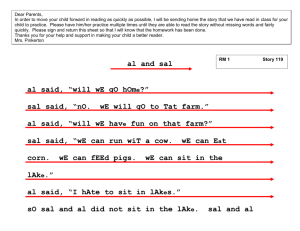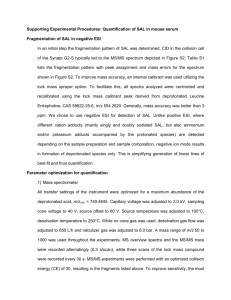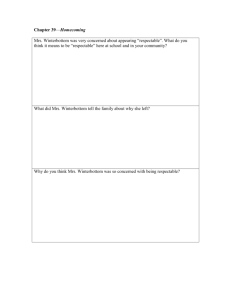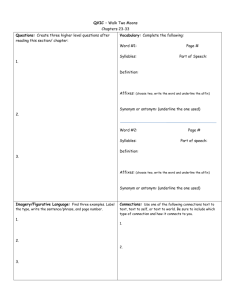The Lottery- Novel Study.doc - choosingtextsforteaching2010
advertisement
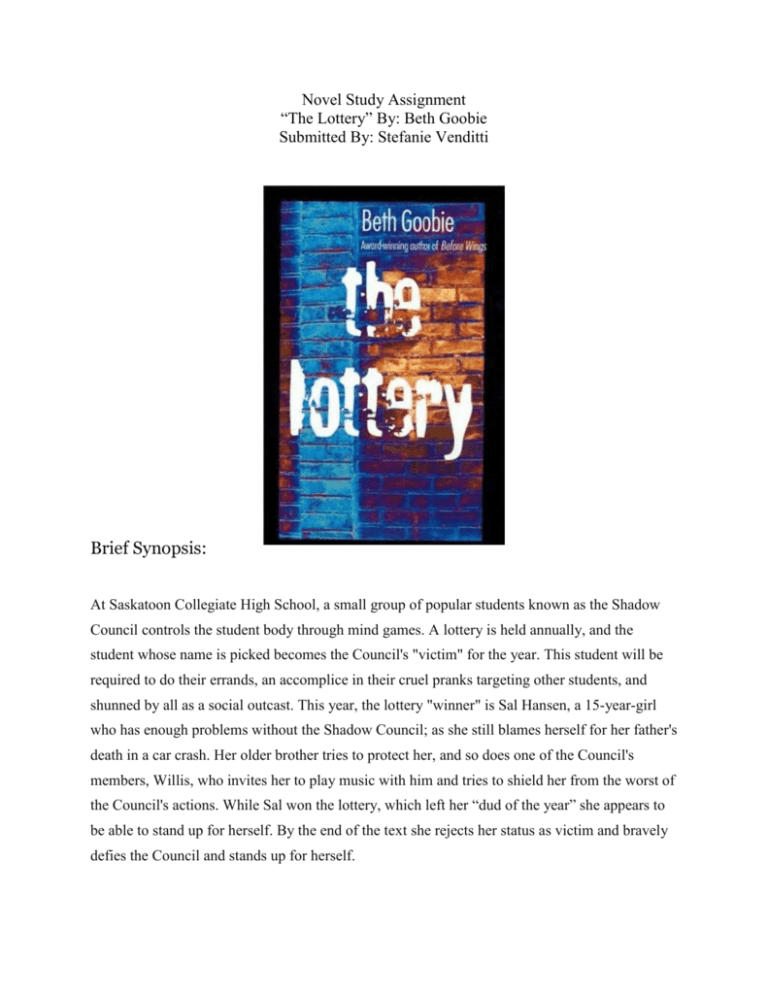
Novel Study Assignment “The Lottery” By: Beth Goobie Submitted By: Stefanie Venditti Brief Synopsis: At Saskatoon Collegiate High School, a small group of popular students known as the Shadow Council controls the student body through mind games. A lottery is held annually, and the student whose name is picked becomes the Council's "victim" for the year. This student will be required to do their errands, an accomplice in their cruel pranks targeting other students, and shunned by all as a social outcast. This year, the lottery "winner" is Sal Hansen, a 15-year-girl who has enough problems without the Shadow Council; as she still blames herself for her father's death in a car crash. Her older brother tries to protect her, and so does one of the Council's members, Willis, who invites her to play music with him and tries to shield her from the worst of the Council's actions. While Sal won the lottery, which left her “dud of the year” she appears to be able to stand up for herself. By the end of the text she rejects her status as victim and bravely defies the Council and stands up for herself. Target Level: Grade 10 Academic English/ Grade 10 Social Studies The target audience of this novel appears to be adolescents at the grade 10 academic level. The issues addressed in the text are at times difficult to come to terms with, however, with the guidance of the teacher the students at the academic level will be able to work well with the concepts of the text. The issues of a “scapegoat” and student politics can be worked into a lesson that will engage the students and have them internalize the material being presented. The students at this level are usually shaping their own identity, so this novel will help them see the affects of bullying and isolation in a school setting. However, this novel does use foul and harsh language, which requires a mature class. I can also see this book benafiting a grade 10 social studies class because of it can be related to social issues of fitting in a belonging. If I was taught this book when I was at this grade level I know it would have greatly shaped my understanding of isolation, grief, and bullying. Story lines: Sal and Bullying In The Lottery Beth Goobie tells the deeply disturbing yet timeless story of the scapegoat. The mechanics of the scapegoating procedure in this case are explained in the novel’s opening lines: “Every student at Saskatoon Collegiate knew about the lottery”. Following the draw, the “winner” is shunned for the entire school year. Friendless, isolated, and quickly demoralized, the student becomes the “dude” of the Shadow Council, a group that disguises itself as a service organization but is really an intimidating group of students. Goobie’s protagonist Sal, finds a scroll inside her clarinet case that informs her of the results of the lottery. She is the outcast. The main plot of the novel is thus kick-started. Sal sees her friends melt away. She is disbelieving, angry, and then despairing. Goobie illustrates the complexities and pain of this situation with clarity and originality. Nothing that Sal is required to do seems that serious on the surface, more in the nature of high school pranks, but Goobie shows us how Sal’s escape routes are cut off one by one, how her sources of comfort and strength fade away. We see Sal beginning to adore Willis, the manipulative president of the Shadow Council. We see her lose her bearings in every area of her life and finally come to herself again, mainly through music. Sal and Friends/ Family Woven into this story are two other plots. One involves Sal’s relationship with Bryden, her fellow third clarinetist and best friend. At the beginning they appear to be wise-cracking teenagers who goof around and tell each other the truth until the trauma of the lottery exposes an aspect of their friendship they have both been avoiding. Goobie paints the classic romance dilemma, the choice between glamorous bad boy and familiar good guy, in fresh colours. During the painful trauma that unfolds because of the council, Bryden as well as Sal’s brother appear to be her only support system. Sal and her painful past. Aside from the council, Sal is also dealing with the suicide of her father some years before, a death for which, against all logic, she feels responsible, and a secret her older brother is keeping with regard to the lottery. Sal continues to have flashbacks that demonstrates how her past continues to haunt her and to shape her future. In The Lottery these strengths are most apparent in the first half of the book. Here her writing is just odd enough to pull you up short and make you rethink the situation you are observing. She cuts through cliché, and proves to be a a strong character. Main ideas: Social/Oppression: (teaching objection- This will help the students understand how the powerless in society struggle to defend themselves against those with power and authority). The most difficult part of the process for Sal is the loss if her close friend, and the role she feels she played in her father’s death. There was a very detailed and graphic description of her father’s death on page 27. It appears that in order to cope with this traumatic event, Sal suppressed these memories, which often emerge and continue to haunt her. Sal is supported by her brother and his best friend, as she tries to navigate her way through oppression. This novel also present the idea of a scapegoat. This text deals with the social struggles between the powerless and the ones in power and how a young powerless girl attempts to stand up against those in a position of authority. Sal is also struggling to fit into the social formate of her school setting. Topic: (Teaching Objection- This can help the students make connections between social dynamics and the role bullying and isolation may have on an individual). The ideas in this novel can lead into wonderful discussions about social dynamics, the nature of bullying, tough choices, and isolation. It deals with the students search for identity by questioning who they are and how they fit in. This novel also deals with the notion that it is difficult to to escape ones past. For instance, Sal’s haunting past continues to enter her current reality through various flashbacks. Culture: (Teaching Objection- This can demonstrate to the students that their school and home life are interconnected and how ones cultural position can impact the development of their personal identity). The novel takes place in both a school and home setting, where the reader is introduced to the social culture of the main characters. This novel develops story lines that demonstrate how the protagonists home and school life are interconnected and related. Both of her cultural identities work together to shape who she is. Text: (Teaching Objective- This will allow the students to see how a novel can come full circle and how the events of the characters past can continue to influence their present life. This text is a first person narrative. While it it presented in present tense, there are flashbacks that shift the text into past tense. Issues that arise at the start of the novel are explained and sorted out at the close of the text. Therefore, the novel appears to come full circle by resolving issues of bullying and self-awareness. As the novel progresses, so does the confidence and maturity of the protagonist. While Sal is faced with many issues, by the end she seems to take control of her own life. Issues or Challenges: This novel may prove to be a challenging text to teach due to the harsh and painful issues it presents. When teaching this text, it is crucial to consider the feelings of the students and how they may react to the issues of bullying, and the death of a parent. Since you may have students that may be currently dealing with these issues, you must be respectful to them and try to present this material in a sensitive way. Thus, a teacher must be sure to follow the “Ethical Standards of Teaching” to ensure that they are respecting the students and caring for the class. However, you must still stress the importance of ending bullying and standing up for those without a voice. The complex and haunting nature of the story draws in the reader and propels the story forward. However, this text deals with challenging issues. Each of the characters surrounding Sal have issues which would provide metaphorical mirror to analyze the characters. This novel deals with various challenges. Many characters within the text are forced to deal with multiple exceptionalities - the high functioning student with autism, the wheelchair bound student who has both legs amputated, the student struggling with obesity and body images, and the student suffering from mental illness. Possible Assignment: I will begin the lesson by explaining how the lottery described in this novel is not something you would want to win. The winner receives a single scroll with a black ribbon as well as a blood-red seal to notify them that they are the winner. To represent the anxiety the students in the novel feel to possibly receive this scroll, the teacher may create an activity to emphasize this idea. - The teacher will begin the activity by handing out cards to each student in the class. - All of the students will go and find their group members, who have the same colour cards. - However, one student will be left without a group- this student will represent the one student selected by the council to be bullied. The students will then right a reflection based on how Sal must have felt to receive the scroll and relate it back to their in class activity. I will also relate other stories of bullying and the effects it has on the students. This assignment will hopefully allow the students to better connect with the text and relate with Sal.
